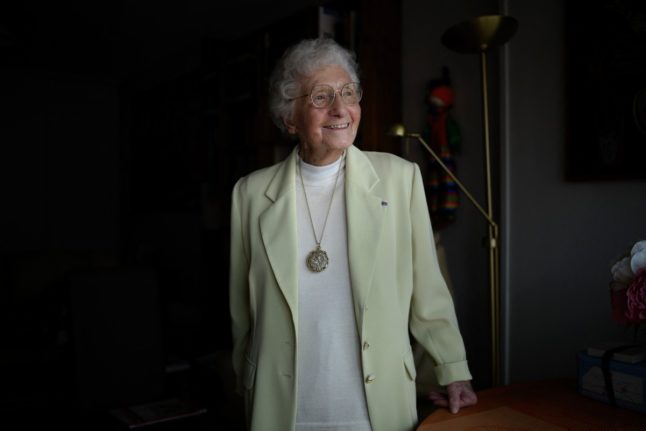A “woman in the shadows” during the Occupation (1940-1944), Berger-Volle was thrilled to be chosen to carry the torch as it passes through Saint-Etienne on June 22nd on its way to Paris for the start of the Olympic Games.
The weight of the torch has been a concern but there was never any question of turning it down.
“I’ve always loved sport,” says the sprightly centenarian who until recently enjoyed an hour’s walk a day.
Grandmother of the gymnast Emilie Volle, who took part in the Atlanta Olympics in 1996, she also wants to be a symbol for women “who have fought to play sport like men”.
“My ideal has always been to unite the world,” she says. “And the Olympics are a wonderful opportunity to get to know other human beings.”
‘Mistreated’
Born in Austria in 1921 into a Jewish working-class family, Melanie Berger began her activism as a teenager in an extreme left-wing group.
“We were atheists and when I started fighting it wasn’t for religious reasons, it was political,” she says. “I’m against all dictatorships.”
After the annexation of Austria by Nazi Germany in 1938, she left her country, went to Belgium and then arrived in France, in Paris in the spring of 1939, disguised as a boy.
When France went to war later that year, all Austrians, even refugees, were seen as enemies and the authorities put her on a train to a camp near Pau.
At Clermont-Ferrand station, she “jumped out” of the carriage.
She was on her own as the other girls did not dare follow her.
“They weren’t political, they didn’t know what a camp was,” she shrugs.
On the contrary, the young activist was well aware that “when you get a chance, you can’t let it go by”.
In 1940 after the French surrender to the Nazis, she found herself in Montauban, where a group of Trotskyist militants she had belonged to before the war was beginning to reform.
“With my French-sounding name, I rented a flat in a dilapidated house, and from there we were able to start work.”
Discreetly, the group drafted and distributed German-language leaflets aimed at turning Reich soldiers.
In January 1942, however, that all came to an end when the police raided the house and she was arrested and brutally interrogated.
“I was mistreated, men beat me,” she says quietly. “The after-effects are still with me. But I’m still here.”
She avoided a death penalty and after 13 months in detention in Toulouse, the 22-year-old Berger was transferred to the Baumettes prison in Marseille.
Members of her group, together with the Resistance, prepared her escape.
‘No’ to Nazism
On October 15, 1943, they came to get her, accompanied by a German soldier who had taken up the cause, while she was in hospital with jaundice.
“I escaped in my nightdress,” she laughs.
Once recovered, she campaigned under false identities until the liberation in the summer of 1944.
After the war, she married Lucien Volle, another Resistance fighter who had taken part in the liberation of Le Puy-en-Velay.
Together, the couple began to devote themselves to the work of remembrance.
“We fought constantly to explain. Not what we had done but why we had done it,” she says.
She has since been awarded a number of decorations, including the Legion d’Honneur.
“I didn’t do much,” she says. “But I did say ‘no’ to Nazism.”
Worried again about the return of extremes in Europe, Berger-Volle hopes that young people will in turn be able to defend democracy.
And despite her advanced age, she intends to use the Olympics to get her message across.
“I wanted to change the world,” she says with a smile. “And I still want to change it.”



 Please whitelist us to continue reading.
Please whitelist us to continue reading.
What an amazing woman! Thanks for this article, it’s so important to remember the work and sacrifices those from her generation made so that we can live in a peaceful Europe.
Fantastic person, so brave.
An example, to us all.
Thank you, for including this article.